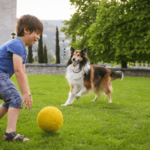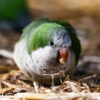- How Long Does A Quaker Parrot Live? - 17 May 2024
- 4 Hacks on Keeping Your Home Clean With Pets - 28 March 2024
- 5 Things to Know Before Bringing Home a New Kitten - 26 March 2024
So you’ve just gotten your new puppy from a breeder. Congratulations! You have many years of happiness to look forward to with your new puppy. While the experience is filled with excitement and joy admittedly many new puppy owners will have a touch of anxiety the initial days of puppy ownership are often laced with countless questions and concerns. Many novice owners will be reluctant to ask questions but there’s no reason to be shy. Every one of us started somewhere and the more questions you ask the better you’ll be prepared to care for your puppy correctly.
Common Questions New Puppy Owners Ask
Here are some common questions that new puppy owners may ask
1. How often should I feed my puppy?
Feeding your puppy the right amount of food at the correct times is crucial for their development. Generally puppies should be fed three to four times a day. This frequency supports their fast growing bodies and provides a consistent source of energy.
However the exact schedule and portion size depend on the puppy’s breed size, age and activity level. Larger breeds like Mastiffs may require more food while smaller breeds like Moodle dogs and Shih Tzus need less but more frequent meals to maintain their energy.
Always consult your veterinarian for a tailored feeding schedule and monitor your puppy’s weight and health for adjustments.
2. What are the best training techniques?
Training your puppy is vital for their development and your mutual understanding of dog chew treats. Positive reinforcement is the most effective and humane training method. This technique involves rewarding good behavior with treats praise or play and gently redirecting or ignoring unwanted behavior.
Consistency is key use the same commands and rewards to avoid confusing your puppy. Start with basic commands like ‘sit’ ‘stay come’ and ‘no’. Remember patience and consistency are your best tools. Avoid punishment-based techniques as they can lead to fear and aggression.
3. What should I know about puppy health and vaccinations?
Puppy health is a critical aspect of their care. Your puppy will need several vaccinations in their first year to protect against common canine diseases. These typically include rabies distemper parvovirus and hepatitis. Your vet will recommend a vaccination schedule based on your puppy’s health lifestyle and risk factors. Regular check ups deworming and flea prevention are also essential. Keep an eye out for signs of illness such as lethargy loss of appetite vomiting or diarrhoea and consult your vet immediately if these occur.
4. How can I ensure proper socialisation for my puppy?
Socialisation is a crucial part of your puppy’s development. It involves exposing them to different people animals environments and experiences in a positive and controlled manner. This helps them become well adjusted adults. Start socialisation early ideally between 3 to 14 weeks of age but do it gradually and carefully. Positive experiences during this time can shape their behaviour for life. Enrol in puppy classes introduce them to friendly dogs and people and expose them to various sounds and environments. Always monitor their reactions and comfort level.
5. What are the best ways to handle puppy teething and chewing?
Puppy teething can be a challenging phase for both you and your puppy. Puppies begin teething around 3 to 6 months of age and during this time they will chew on anything they can find. To manage this provide plenty of appropriate chew toys. Encourage them to use these toys instead of household items by praising them when they chew on the right things. If they chew on something inappropriate redirect them calmly to a toy. Freezing some chew toys can also provide relief for sore gums.
6. How can I address separation anxiety in my puppy?
Separation anxiety is common in puppies. It’s crucial to teach them that being alone is okay. Start by leaving them alone for short periods and gradually increase the time. Create a safe comfortable space for them like a crate or a specific room. Leave them with toys and treats to keep them occupied.
Avoid making a big fuss when you leave or return as this can reinforce the anxiety. If your puppy shows severe anxiety. Consider consulting a professional trainer or a veterinarian for advice.
7. What kind of diet is best for my puppy?
A balanced diet is essential for your puppy’s growth and health. Puppies require more protein calories and essential nutrients than adult dogs. Choose high-quality puppy food appropriate for your puppy’s breed and size. Large breed puppies for instance need food that supports controlled growth to prevent bone and joint issues. Avoid human food as some can be harmful to dogs. Always have fresh water available. Consult with your vet to determine the best diet plan for your specific puppy.
8. How do I groom my puppy properly?
Grooming is an important part of puppy care. It helps keep their coat and skin healthy and provides an opportunity to check for any health issues. Brush your puppy regularly to remove loose hair and prevent matting. The frequency depends on their coat type short haired breeds need less frequent brushing than long haired ones. Bathe your puppy only when necessary as over bathing can strip natural oils from their skin. Don’t forget to trim their nails clean their ears and brush their teeth regularly.
Also Read: How To Get A Dog Unstoned? Simple Tips to Follow
Final Thoughts
As you embark on this journey with your new puppy remember that every puppy is unique and what works for one may not work for another. Be patient observant and responsive to your puppy’s needs. While challenges are inevitable. The joys and rewards of puppy parenthood are immense.
Cherish these early days of exploration and bonding. They lay the foundation for a lifetime of love and companionship. Always feel free to seek guidance and support whether it be from your puppy breeder or from your fellow dog owners. There’s a wide community of passionate and knowledgeable dog owners so make use of it!
















